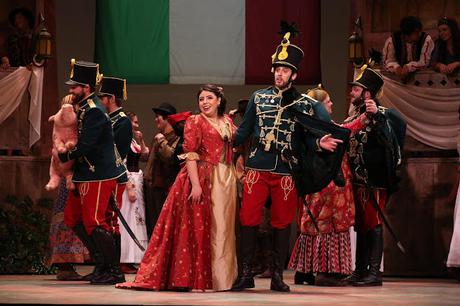
True love wins the day in the last scene if Die Zigeunerbaron.
Photo courtesy Manhattan School of Music.
From the first bars of the vibrant overture to the waltzes, csardases and polka rhythms that dominate the score, this is a much better show than Fledermaus. For one thing it has more of a story, anchored on the prodigal title character Sándor Barankay. This enterprising fellow meets ideal girlfriend, discovers buried treasure on his property, gets drafted into the Hussars (the elite warrior corps that defended the Austro-Hungarian Empire) and returns victorious (and unhurt) over the course of a giddy three acts. The opera's appeal was helped by the use of the original German text for the arias and choruses. The spoken dialog was performed in English.
Friday night's performance featured the second of the two casts. As Sándor, tenor Timothy Lanigan had a spry appeal, with an affable stage presence and a light tenor that sometimes fought to be heard over the orchestra. As Saffi, the Gypsy girl who turns out to be a long-lost Hungarian princess (hey, it’s operetta, you go for the music, not the plot) Shaina Martinez was the real deal, a smoldering soprano that soared above the stave in the pair’s long love duets. Her return (to marry Sándor) at the opera’s happy ending was very welcome indeed.
Der Zigeunerbaron was written in 1885. it owes the debt of parody to both Il Trovatore and the later La Forza del Destino. The maternal Czipira, (Michelle Blaumann) is the sane version of Azucena, and her complex relationship with Sándor echoes the Italian opera. This singer had a strong a pond vibrant mezzo as colorful as her swirling shawls and skirts. And yes, the second act boasts a certain, very familiar camp work scene, complete with a (German) anvil chorus.
The Forza parallel comes with the arrival of a Hussar troop which recruits most of the characters to march off to war ends the second act with a big finale reminiscent of the Italian opera’s Rataplan chorus. Here it was led by baritone Michael Gracco. He was both funny and focused, with a bluff presence and a pleasing, heroic tone that will suit as the hero of another opera. His arrival upped the energy level of the entire show. Indeed, the arrival of the troops in the second act literally saved the day.
One might speculate that the disappearance of Die Zigeunerbaron from the stage is due to the tone of its libretto. The story, adapted from a play by one Ignatz Schnitzer, looks sharply at undisguised racism in The old Hapsburg Empire. Here, the hate blossoms from the self-appointed “morality committee” of a tiny Hungarian village treats the indigent Romany population that lend it some bald pay needed color, indeed, these Austrians’ treatment of the “Gypsies” is an ugly forerunner of the Nazis, who subjugated and then massacred these people under the Third Reich. Today, this show is once again relevant.

